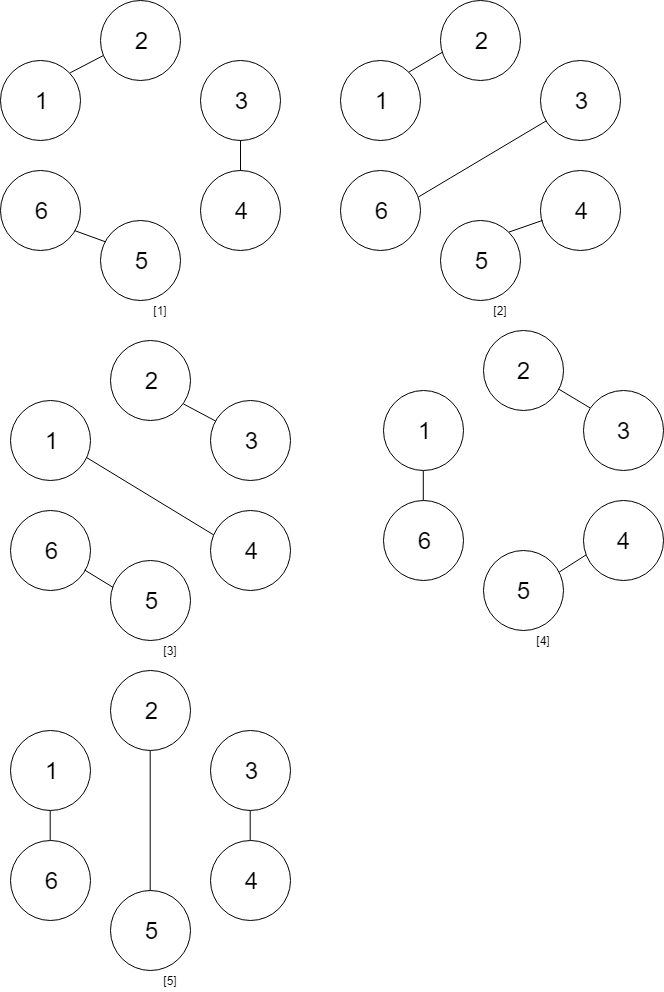| comments | difficulty | edit_url | rating | source | tags | ||
|---|---|---|---|---|---|---|---|
true |
Hard |
1951 |
Biweekly Contest 13 Q4 |
|
You are given an even number of people numPeople that stand around a circle and each person shakes hands with someone else so that there are numPeople / 2 handshakes total.
Return the number of ways these handshakes could occur such that none of the handshakes cross.
Since the answer could be very large, return it modulo 109 + 7.
Example 1:
Input: numPeople = 4 Output: 2 Explanation: There are two ways to do it, the first way is [(1,2),(3,4)] and the second one is [(2,3),(4,1)].
Example 2:
Input: numPeople = 6 Output: 5
Constraints:
2 <= numPeople <= 1000numPeopleis even.
We design a function
The execution logic of the function
- If
$i \lt 2$ , then there is only one handshake scheme, which is not to shake hands, so return$1$ . - Otherwise, we can enumerate who the first person shakes hands with. Let the number of remaining people on the left be
$l$ , and the number of people on the right be$r=i-l-2$ . Then we have$dfs(i)= \sum_{l=0}^{i-1} dfs(l) \times dfs(r)$ .
To avoid repeated calculations, we use the method of memoization search.
The time complexity is
class Solution:
def numberOfWays(self, numPeople: int) -> int:
@cache
def dfs(i: int) -> int:
if i < 2:
return 1
ans = 0
for l in range(0, i, 2):
r = i - l - 2
ans += dfs(l) * dfs(r)
ans %= mod
return ans
mod = 10**9 + 7
return dfs(numPeople)class Solution {
private int[] f;
private final int mod = (int) 1e9 + 7;
public int numberOfWays(int numPeople) {
f = new int[numPeople + 1];
return dfs(numPeople);
}
private int dfs(int i) {
if (i < 2) {
return 1;
}
if (f[i] != 0) {
return f[i];
}
for (int l = 0; l < i; l += 2) {
int r = i - l - 2;
f[i] = (int) ((f[i] + (1L * dfs(l) * dfs(r) % mod)) % mod);
}
return f[i];
}
}class Solution {
public:
int numberOfWays(int numPeople) {
const int mod = 1e9 + 7;
int f[numPeople + 1];
memset(f, 0, sizeof(f));
function<int(int)> dfs = [&](int i) {
if (i < 2) {
return 1;
}
if (f[i]) {
return f[i];
}
for (int l = 0; l < i; l += 2) {
int r = i - l - 2;
f[i] = (f[i] + 1LL * dfs(l) * dfs(r) % mod) % mod;
}
return f[i];
};
return dfs(numPeople);
}
};func numberOfWays(numPeople int) int {
const mod int = 1e9 + 7
f := make([]int, numPeople+1)
var dfs func(int) int
dfs = func(i int) int {
if i < 2 {
return 1
}
if f[i] != 0 {
return f[i]
}
for l := 0; l < i; l += 2 {
r := i - l - 2
f[i] = (f[i] + dfs(l)*dfs(r)) % mod
}
return f[i]
}
return dfs(numPeople)
}function numberOfWays(numPeople: number): number {
const mod = 10 ** 9 + 7;
const f: number[] = Array(numPeople + 1).fill(0);
const dfs = (i: number): number => {
if (i < 2) {
return 1;
}
if (f[i] !== 0) {
return f[i];
}
for (let l = 0; l < i; l += 2) {
const r = i - l - 2;
f[i] += Number((BigInt(dfs(l)) * BigInt(dfs(r))) % BigInt(mod));
f[i] %= mod;
}
return f[i];
};
return dfs(numPeople);
}
